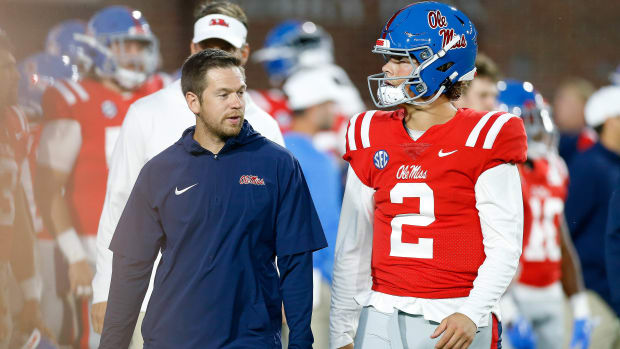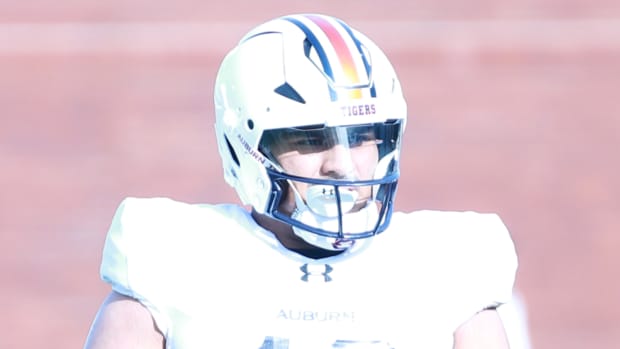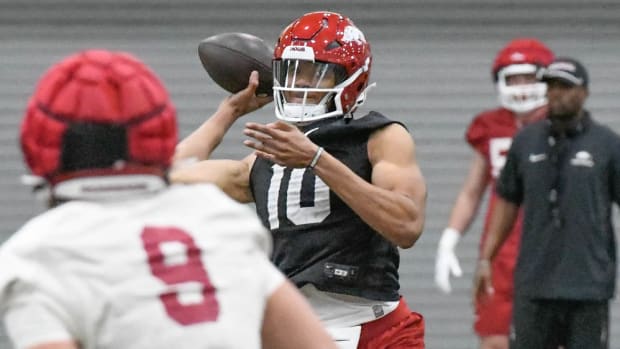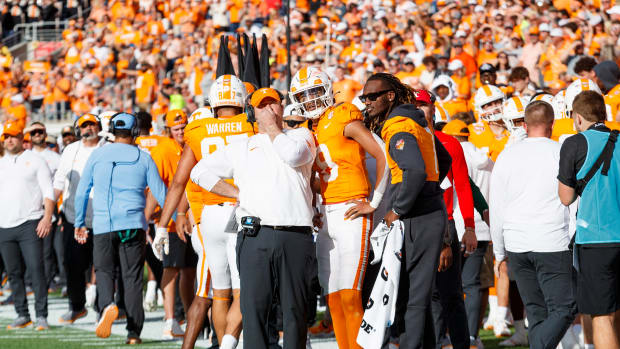Could return to Ohio State be more lucrative for J.T. Barrett than entering NFL draft?
GLENDALE, Ariz. — Ohio State redshirt junior quarterback J.T. Barrett entered the College Football Playoff with a clear thought process about his future. He hadn’t spent much time considering entering the NFL draft after his fourth season at Ohio State, but he didn’t shut the door on the notion, either. Barrett isn’t a coveted prospect at the NFL level, as his tangibles—6’1”, 4.5-second 40-yard-dash speed and an average arm—don’t get NFL evaluators excited. But he wanted to speak with his parents, weigh his options and then decide.
In the aftermath of No. 2 Clemson’s 31–0 annihilation of No. 3 Ohio State in the Fiesta Bowl, Barrett gave a strong indication of his future plans. After a night when Clemson’s defensive line rented an Airbnb in the Buckeyes backfield, Barrett gave some insight into next season. “I didn’t really give it that much thought,” he said of the NFL. “But it will be really hard for me to walk away when we just lost 31–0.”
Barrett finished the night 19 for 33 for 127 passing yards with two interceptions. He didn’t get much help, as he spent the game victimized by drops and tipped balls and pirouetting away from Clemson’s relentless pass rush. The Tigers sacked him three times and finished the game with 11 tackles for loss.
After Fiesta Bowl flop, one thing is clear for Ohio State: Change is coming
This leaves Barrett in a unique position for 2017, where the question could be raised: “Is it actually more valuable for him in the long term to return to Ohio State than to declare to play professionally?”
Barrett is 26–4 as a starter, 10 victories away from tying Art Schlichter (1978–81) for the most wins in school history. If he returns next season, he’d again be one of the faces of the Buckeyes and the sport. If he chose to go to the NFL, he’d either be a late-round pick or not get drafted at all. He could be a backup, land on the practice squad somewhere or end up scrambling for a job.
Obviously, Barrett can’t be compensated by the Buckeyes. But would a return to Columbus for one more year of the highest wattage of star power end up meaning more in the long run in terms of endorsements, job opportunities and building his brand? It’s a question with no definitive answer, but one that speaks to the unique position of Barrett’s success and what he’s accomplished at Ohio State.
“You can’t put a price tag on it,” coach Urban Meyer said in December. “He’ll forever be, not just in Ohio State history, he’ll be one of the most successful college football players of all time.”
Meyer adds: “This is not about money. If it is, I’m not prepared to have that conversation. But I’m prepared to talk about life after football, what that means to when you come to Columbus, when you’re on TV, maybe coaching here some day after your playing career. It’s hard to put a dollar value on that.”
Forever Dominant: Reloaded D-line leads way in Clemson's blowout of Ohio State
Andy Schwarz, an economist and partner at the economic consulting firm OSKR, disagrees. He said in an e-mail interview that short of Barrett having a monster year or “perhaps having Tim Tebow-like charisma,” one more year in college won’t help him much more monetarily. “Anytime both parties to a transaction would be better off, but that transaction doesn’t happen (here because of NCAA rules), the world is a worse place, economically speaking,” he said, referring to Barrett’s inability to receive money to play in Columbus next year. “So yes, if he could capitalize [next year], one could argue he should stay. But since he cannot, it’s easy. Go!”
Barrett’s name isn’t hot in NFL circles right now, especially with his completion percentage dipping for the second straight year. He finished this season at 61.5%, down from 64.7% in 2014. One NFL scout who has studied Barrett closely said the quarterback would likely go undrafted right now. He said Barrett appears to have had a crisis of confidence, especially the past two months, and thinks Barrett has “regressed as a thrower.” Meyer hinted at a thorough vetting of the Buckeyes coaching staff after the Fiesta Bowl, which capped a season in which Ohio State finished the year ranked No. 82 in passing offense. “We will become a good passing team,” Meyer said of next season. “We will.”
Barrett’s coaches and teammates describe him as a deep thinker, an anti-millennial who rarely peeks at his phone and doesn’t speak without fully pondering his answers. In interviews, he’s uncommonly reflective and thoughtful. Earlier in December, sitting in Ohio State’s indoor practice facility, Barrett was asked about playing in the NFL. “Everyone sees the glamour of the NFL, being a professional and getting paid to do what you love,” he said. “All of that is great, but I feel like the business part of it gets so much involved in the NFL that there’s not that brotherhood as there is in college.
“Like in college, you’re Buckeyes for life. In the NFL, how many people can say they were a Buffalo Bill forever?”
He added that he’s seen dozens of players go off to the NFL and come back to Columbus to describe the differences. “Are you really hanging out at [your teammate’s] house? No, you’re not playing video games in the dorm. I know that, something for me personally, just embrace the moments I have here because it’s not forever. This four-, five-year span we have at Ohio State, you gotta take advantage because it won’t be the same.”
Clemson, Deshaun Watson rout Ohio State to earn shot at redemption in title game
Barrett didn’t win the starting job at Ohio State in 2015 after he failed to beat out Cardale Jones in training camp. Barrett was coming off a broken ankle that ended his dazzling redshirt freshman campaign prematurely. He finished fifth in the Heisman Trophy voting in 2014, earned first-team All-Big Ten honors and set 19 records. In 2015, he pressed. “I felt like part of my struggle of 2015 was trying to impress people I didn’t know,” he said, noting the heavy NFL scout presence at practice. “Then I’m pressing and forcing balls I don’t need to throw or trying to do too much.”
He said he came to the realization that thinking too much hurt his game. He said it took about four days of camp before he changed.
“I was at camp and stressing myself,” he said. “That was a thing, definitely. I learned. I’m not living my life like that.”
The expectation is that Barrett is living his life in Columbus next year. He graduated in December, which means transferring would be a theoretical option. The NFL could be, too, where his 26–4 record and successful career would force teams to take a long look despite his measurables.
Barrett grew up in Wichita Falls, Texas, which will always be his hometown. But four years into his time at Ohio State, he considers Columbus his home. He said he hopes his legacy at Ohio State is as a selfless competitor “who always cared about others, team first.” He adds: “I love Ohio State, love all the things it’s done for me as a person and a player.”
A decision to return would increase that love affair on both ends and further Barrett’s indelible mark at Ohio State. That appears to be the obvious option.





